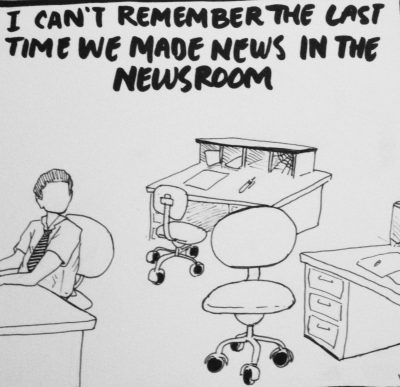A journalist’s life is always fast-paced, with breaking news and briefs galore. The global pandemic has not slowed us down, but has, if anything, given us more fuel to keep the public informed.
Our reporting has, of course, evolved over the last nine months. Here at The Daily Free Press, and publications around the world, we have gone fully digital. We no longer pack our office while working late at night or badger people on the sidewalk for interviews.
Journalism has always been a profession quick on its feet and ready to adapt, but that does not come without a price.

The Tribune Publishing Company told The Hartford Courant Guild Friday its newsroom would close indefinitely. Editor-in-chief Andrew Julien wrote in an email to Courant Guild staff that the decision was made because the current economy and public health crisis has placed a strain on the financial logistics of keeping a newsroom.
Julien wrote, “It won’t change the essence of what we do: Delivering the high-impact journalism readers have come to expect from the Courant and crafting creative solutions that meet the needs of our advertising partners.”
Julien is correct in saying the essence of the paper’s job won’t change. But, the Courant team is missing out on a vital space for its reporters.
The culture of journalism once relied so heavily on the newsroom. In every television show or movie about journalists, reporters are running around, yelling frantically and working hard to get their stories out for the day. This environment is one of the most integral parts of the job.
Newsrooms are a collaborative space where journalists can bounce ideas off of their fellow staff members and editors to gain different perspectives on articles, which helps defend their writing from bias and tired narratives.
For FreeP reporters, the newsroom has always been our safe haven. One of the main reasons editors make the time commitment to work for this paper is because of the memories and friendships we would expect to make in the office.
That experience has been taken away from us, and we are now forced to finish every task in our dormitories. Our roommates sit across the room while we interview government officials, pitch ideas at budget meetings and edit stories for eight hours a night.
We have had to prioritize the safety of our writers. We no longer send them out for in-person interviews when we can avoid it, and they can no longer come to the office to work.
We allowed three editors in the office at a time — wearing masks, disinfecting surfaces and social distancing — but often, we would just stay out. Everyone is afraid of making someone else uncomfortable with their presence.
Despite our inability to congregate in a common space, we have discovered we do not need a newsroom to successfully report the news.
And for many small publications, this is the norm. They either didn’t have a newsroom to begin with, or may be shutting down because of increased financial burdens. We would rather cut the newsroom than the paper as a whole.
But, the loss of this industry’s physical foundation comes at a cost.
We cannot throw newsrooms to the wind, and we shouldn’t let hedge-fund companies undermine the necessity of these establishments.
The quality of reporting is undoubtedly impacted by these losses. Without a shared physical space, reporters can’t yell across the room about a problem, fact check or misplaced comma. At the FreeP, we must now communicate mostly via Google Docs comments and Slack messages, reminded of how much more effectively previous editors learned through in-person interaction.
Our ability to improve our writing and reporting has been hampered. When everything’s remote, it’s easier for an editor to simply fix a mistake they see rather than message a writer to hop on the document and correct it themselves. In a field like this, we are always on a time crunch, and our desire to be efficient keeps us from properly communicating with one another.
Newsrooms also serve as a hub of history. Archives of past editions line the walls or, in the FreeP’s case, stack the floors. A plethora of resources — including printers, editing software and desktop computers — can all be found in one place. Especially for college reporters, not having those resources can limit your work.
We now burden our home environments with our journalistic work, which only exacerbates our already-notorious inability to balance our personal and professional lives.
Working from home does bring a sense of convenience we typically wouldn’t have, but the culture of journalism ultimately depends on a newsroom. We cannot lose out on that in the long run, and major corporations should not be so quick to discount the importance of our offices.
The chaotic energy, the hustle and bustle, the first drafts of history — these all belong in the newsroom, and so do we.





















































































































